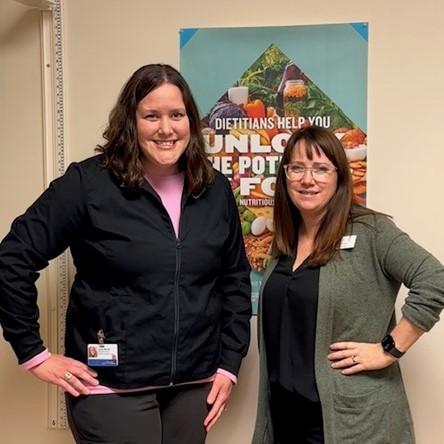Diabetes educators in action: Empowering patients to live well with diabetes at Strait Richmond Hospital

As Diabetes Educator Day 2024 shines a spotlight on the dedicated professionals who help individuals manage diabetes effectively, we meet two exceptional team members at Strait Richmond Hospital’s Diabetes Clinic in Cape Breton, Nova Scotia—registered dietitian Krystal Burns and diabetes nurse educator Lacey Benoit. Together, they navigate the complexities of rural diabetes care, providing essential support and personalized strategies to help patients lead healthier lives.
The Diabetes Clinic’s approach goes well beyond basic blood sugar management. Drawing on her background in mental health and pediatric care, Benoit brings a compassionate, patient-centered approach that addresses both the physical and emotional challenges of a diabetes diagnosis. “I always encourage my patients to openly express their feelings,” she shared. “There’s still stigma associated with diabetes, so it’s important to create a non-judgmental space where patients feel comfortable.”
Unlike in larger urban centres, where specialists often focus on specific patient populations, the Diabetes Clinic team works with a broad range of patients—adults, children and expecting mothers alike. "In a rural setting, you see everything," Burns noted. “We work with people managing type 1, type 2, gestational diabetes, and even steroid-induced diabetes. It requires staying current on all aspects of diabetes care to meet each patient’s needs.”
Breaking Down Barriers and Facing Challenges Together
Financial challenges remain significant for many patients, who often struggle to cover the cost of supplies, medication, and new technologies that make diabetes management easier. “A major challenge in the clinic is the affordability of supplies and medications,” Benoit explained. “When patients can’t afford continuous glucose monitors or testing supplies, it affects their ability to control their diabetes effectively.” Diabetes educators and social workers often help patients navigate the financial aid options and community resources available to them, easing some of the burden so they can focus more on their health.
The financial strain is compounded by food insecurity, a reminder of how a person’s circumstances can impact diabetes management. "We tailor meal plans to fit what’s accessible," said Burns. "If someone relies on a food bank, I work with the foods they have, modifying recipes to meet their needs."
Beyond financial struggles, diabetes stigma presents another challenge. The clinic team works hard to reassure patients that they are not defined by their condition. “People often feel guilt if their blood sugar is high,” said Burns. “I remind them that diabetes doesn’t define them. They’re managing a challenging condition, and sometimes, factors like stress or illness can affect their numbers.”
Living Strong with Diabetes
Despite the many challenges they face, the resilience shown by the clinic’s patients is a constant source of inspiration for Burns and Benoit. Benoit recalled one particularly inspiring patient who managed to stay positive even in the face of repeated health setbacks. “This patient faced a series of health challenges, one after another,” she said. “But their determination to keep going, to reach out for help, and to lean on their support system was remarkable. It’s a reminder that strong coping strategies and a positive attitude can make a huge difference.”
For Burns, the resilience of young patients is especially moving. She works with children who, while balancing school, sports, and even part-time jobs, manage their diabetes with remarkable maturity. “People don’t see the planning these kids put in—the behind-the-scenes management, the insulin pumps, the sensors,” she explained. “Their resilience is amazing. They’re managing a complex condition, and they’re doing it with strength and determination.”
Both Burns and Benoit emphasize the importance of celebrating small victories with their patients. "Small changes add up to big changes over time," said Benoit. "It’s important for patients to see the progress they’re making, whether it’s a single day of stable blood sugar or hitting a milestone in their health journey."
Looking Toward a Future of Better Care
The clinic’s diabetes educators are committed to helping patients access the resources and programs available to them, supporting their journey toward effective diabetes management.
Many patients at the clinic now have access to continuous glucose monitors, which provide real-time insights into blood sugar levels and make monitoring less invasive. “These monitors make a real difference,” said Benoit. “They not only help patients manage their glucose levels but also allow us to track daily patterns and adjust care plans accordingly.”
Burns emphasized the significance of recent advancements, noting that new options for insulin and medications offer patients greater flexibility and independence. “When I started in this field, we relied on strict meal plans to match insulin regimens,” she recalled. “Now, with the newer insulins available, patients have more freedom in their diets, making it easier to fit diabetes management into their lives.”
As Diabetes Educator Day highlights the role of educators, the work at the Diabetes Clinic reflects real progress toward better care and support. With advances in resources, improved technology, and a collaborative approach, diabetes management is becoming more manageable for patients in Richmond County and beyond. Most importantly, the resilience shown by their patients serves as a daily reminder of the strength and courage of those living with diabetes.
“We’re inspired every day,” Benoit shared. “It’s rewarding to see our patients’ progress and to know we’re helping them live healthier, fuller lives.”
In honour of Diabetes Awareness Month, we encourage those impacted by diabetes to explore resources from Diabetes Canada and Diabetes NS. Both offer valuable tools, from educational guides and webinars to financial support information, empowering individuals to manage diabetes with confidence and connect to a supportive community.